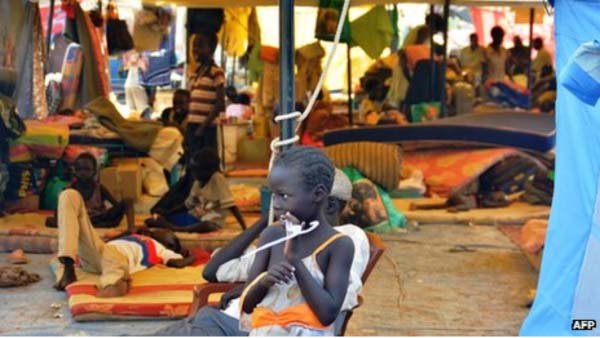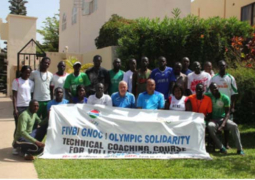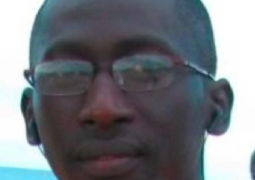
(Wednesday 8 January 2014, Issue)
When South Sudanese voted in a referendum for independence the mood in that country was euphoric. Decades of brutal conflict with the North were confined to history books and a new page was opened. In July 2009, the day of the country’s independence celebration, hundreds of dignitaries and a good number of heads of states flooded Juba to witness the birth of the world new state.
Memories of the country’s Liberation leader, John Garang, were revived. His image emblazoned on the Sudan pound and his mausoleum was the center of celebration. Dr John Garang, an economist turned guerrilla leader, founded the “Ayangya” Movement, which in his tribal Dinka mean poisonous snake. The movement was later named Sudan People Liberation Army (SPLA).
He waged a bloody-non-stop civil war with the Khartoum government in the North to gain autonomy for the South, an area predominantly dominated by Christian and traditional worshippers, which is a stark contrast to the Muslim Arab Masarriya dominated North. Even though this relationship is due to the colonial legacy left by the British, successive governments in the North were deliberately negligent of the plight of people occupying the oil-rich South of the country.
South Sudan where John Garang grew was mired in poverty, dilapidated colonial infrastructures, little if any government presence and repressive centralized government in Sudan determined to impose religious practices and norms – sharia- which is totally alien to South Sudanese.
These unintended consequences were to force people like Dr John Garang to emphatically repulse the North. After trying by peaceful means to get these reversed, he failed to persuade Sudan’s then President Jaffer Al Nemin to allow the South to be autonomous. He resorted to arm struggle to achieve autonomy for South Sudan from an unyielding Nemin. The ensuing war cost the lives of tens of thousands of people from both sides and displaced many. Sensing that the war had cost the Sudanese government blood, tear and sweat, President Omar Al Bashir, who overthrew the government of Nemin in 1989, agreed to have talks with the SPLA leaders after he himself tried and failed to crush the rebellion.
The talks, held in the Ugandan Capital, Kampala, were brokered in 2005 by the regional grouping Inter-Government Authority on Development (IGAD) led by President Musaveni of Uganda, the UN and the United States then led by George W Bush. The talks saw two mortal enemies-Garang and Bashir-shook hands after signing on the dot lines. It was all smiles and jokes between them. That event was indeed remarkable. It was indeed historic. In one of the clauses, as part of the agreement, South Sudan will be autonomous from the North and in 2009 vote for total independence or continue being part of the North. Something they longed for.
When the event came for them to decide their faith, South Sudanese didn’t miss the opportunity. Approximately 95 per cent of them voted for independence. Sadly, John Garang, the battle-hardened SPLA Leader, will not live to witness all this. He died tragically in a plane crash en route from Entebe, Uganda where it was alleged he secretly met President Yoweri Musaveni. His loyal deputy, Salva Kiir, was appointed by the SPLA as dictated by the departed boss to succeed him as leader.
Salva Kiir led an independent South Sudan whilst Riek Machar became his deputy. Both men are from different ethnic groups. Kiir is from the dominant Dinka ethnic group while Machar is from the La Nuer ethnic group. The relationship between the two was always fraught with difficulties. This emanated from the deep mistrust that existed between the two.
Rick Machar, in 1991, in the peak of the Liberation struggle, defected to the North against the South in what was a somewhat a shocker for then leader Garang and his deputy Kiir. He was described as a “sellout” and “Uncle Tom” by his fellow southerners. He crawled back to the SPLA when the gravity of truth became apparent to him that triumph for the South was inevitable. He was reluctantly accepted back into the fold of the SPLA in the name of unity to turn the heat on the North. This mistrust has been lingering between the two despite their in-front of the cameras unity. The hatchet is not buried and forgotten. The massacre that Machar forces gun down when he colluded with the North in Unity State is still fresh in the minds of the Dinkas, victims of that massacre.
With election looming on the horizon within the SPLM in 2014 for the party leadership in the 2015 presidential elections, President Salvir Kiir moved fast and outflanked Riek Machar knowing that his deputy was having serious presidential ambition. In July 2013 President Kiir announced that he sacked his cabinet including Machar. For days the country was in limbo with no government. Serious warning from the international community began to be issued. The US led the way expressing “serious concern”. Weeks later, the names of those who made it to the cabinet came to fore. Riek Marcher’s name was conspicuously absent from the list, in effect ditched. The Speaker of the National Assembly, John Marie Igga, who is from the Bari tribe, was appointed Deputy President. Livid and incense by this purge, Machar, who was once an aid to the Sudanese President Omar Al Bashir, who is charged by the International Criminal Court (ICC) for war crimes and crimes against humanity in Darfur, vowed to challenge President Kiir in the SPLM internal elections.
Coup
attempt
In
mid-December, when South Sudanese were preparing for Christmas, they woke to
the News of sporadic gun shots in the capital Juba. The gunfire emanated from
the presidential guard brigade, a largely unruly army with a reputation for
brutality. Alarmed that his regime was under threat, Salvar Kiir immediately
addressed the nation, clad in his desert-colour military uniform.
He was clear in his mind who was behind the abortive coup: Riek Machar describing him as “a prophet of doom”. Machar strenuously denied the allegation. Many people were arrested and locked in jail many loyal to the former Vice president.
The army splits into two with some backing the government and others Machar. The fiercely military General peter Gadet led ragtag rebels as they captured Bor, capital of the restive Gongelei state and Beintui, Unity state capital. The pendulum swung when the government recaptured these two states.
Peace
talks
The
regional grouping IGAD acted swiftly and decisively to push both sides to the
negotiating table to avert a spill-over affects of the conflict. Both sides
have sent their delegation to Addis Abba, Ethiopia for talks. Machar’s
delegation is led by the sacked governor of Unity State, Taban Deng Gai while
Nhial Deng Nhial led the government delegationWill the talks yield anything substance? Tedros Adhanom, the Ethiopian
foreign Minister and chair of the talks will bring both sides to an agreed
position but that would not be the magic wand solution. The problems in South
Sudan are deep rooted.
Ethnic tensions, cattle rustling, illiteracy, poverty, corruption and abuse of power are the root causes of the problem. Until and unless they are resolved, South Sudan will remain in political lockjam. That is why a Truth and Reconciliation Commission, or anything of that sort, is needed to bring South Sudanese together. I salute the courage of IGAD to end the conflict but how can a conflict be brought to an end when both sides refused to respect calls for ceasefire? Fighting is still raging in Bor, Beintui and Malakal, capital of Upper Nile state. Both sides are fighting tooth and nail to go into the talks from a strong bargaining position all at the expense of the population of South Sudan, who are bearing the brunt of the conflict. Thousand are living in squalid refugee camps run by international aid agencies like Red Cross and MSF. After spending days in Addis Abba both sides are yet to see face-to-face for talks.
If two bulls fights for a kraal it is the lambs who suffers. Therefore, the two factions should try and see eye to eye on issues that are going to be on the table from prisoner’s release, cessation to violence to reaching for an amicable settlement. The inclusion of Lama Kohl, the official opposition leader, in the talks is a bold move by President Kiir. That is not to say that South Sudanese forgot that he was enjoying all the trappings and privileges that came with is position when he was Minister for Foreign Affairs in Sudan when today crops of SLAM leaders were putting their lives on the line to gain independence.
Was
South Sudan fit to be independent?
The
process of building a nation from scratch was always going to be difficult for
South Sudan. In the build-up to the independent, many analysts warned the
international community that the country cannot be governed by the SPLM
leaders. They advocated for the country to be under the control of the UN for a
decade. But their voices were drowned by those who were in for South Sudanese
running their country for themselves. Oil, which is embedded beneath the soil
of the South in abundance, was one of the key factors that led to such rush for
independence. With the burgeoning rise of China and their ever-increasing presence
in Sudan, the Anglo-Saxon countries – US and Britain in particular – supported
the split of what was the biggest country in Africa to shut China out of the
oil-rich South. With the benefit of hindsight, they realized how fatal a
mistake this was hence the rush during the crisis to save their face. But in
actual fact they should hang their heads in shame. They compounded the problems
of South Sudan. The political Plate of Present Kiir is too full. The lists of
challenges are piling up by the day. During the early birth of the country,
George Arthur rebel against the country. He was killed in an air strike. David
Yaw Yaw is also rebelling against the state after failing to secure the
governorship of Gongelei State in democratic elections. He is proven to be an
elusive figure still in the bush wrecking havoc. He must be very happy that the
fight is within the government not against him for now.
It is going to take time before the fledgling nation that we called South Sudan can be stable, prosperous and develop. Ah, South Sudan the Country that I loved so much growing up.
Author: Amadou Camara is an intern at the American corner and final year political science student at the University of The Gambia



